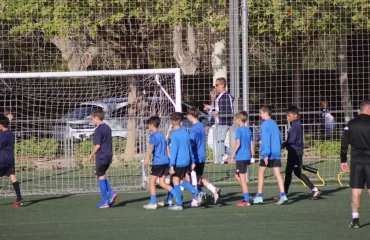
Athlete development is a multi-dimensional process that requires a perfect balance of skill-building, mental conditioning, and fostering discipline. Schooling starts from home but teachers play a pivotal role in a young kid’s life. The same can be said about the coaches who hold the key to unlocking an athlete’s full potential, both on and off the field. Here are Top-8 Coaching Strategies for Athlete Growth.
1. Individual Training Plans
Every athlete is different, and their training should reflect this notion. Tailoring training programs that cater to suit an athlete’s unique strengths, weaknesses, and goals allows them to progress at their own pace.
- Why it works: Allows focusing on individual mistakes, gaps in skill-set while maximizing potential.
- Ways to implement: Coaches need to conduct regular assessments of athletes based on their performance in training. Goals should be set for each individual. Feedbacks from parents should be acknowledged.
- Example: A Football player might focus on improving his dead-ball skills in individual sessions, while also training with his teammates, improving his overall game.
Customizing training plans not only enhances performance but also keeps athletes engaged and motivated.
2. Building Communication and Trust
Building a strong relationship with athletes is critical for effective coaching. Athletes need to feel valued, heard, and understood.
- Why it works: Open communication helps improve trust, allowing athletes to share concerns and ask questions around training.
- How to implement: Conduct regular one-on-one assessment, listen actively, and encourage honest dialogue between you and the athlete.
- Example: If an athlete feels overwhelmed with school and training, they should feel comfortable discussing it with their coach for a solution. As a coach, it’s your responsibility to provide a solution to the kid how he can strike a balance between sports and academics.
A supportive environment ensures athletes remain mentally and emotionally focused on their growth on and off the field.
3. Focus On Mental Toughness
Athletic success is as much about mental strength as physical ability. Building mental resilience allows athletes to perform better in pressure situations. Every athlete faces setbacks, and challenges in their sports career, so it’s imperative to teach them how to negotiate a tough period.
- Why it works: Mental toughness builds confidence and composure amongst athletes. These are critical for peak performance.
- How to implement: Incorporate exercises such as Yoga and Meditation. Ask young athletes to visualize goals and how they can reach them. Stress management techniques also work wonders.
- Example: Teaching a batsman to focus on the next ball, after he misses the last one, can keep him fully focused, reducing the chance to make more errors.
Mental toughness not only improves athletic performance but also prepares individuals for life’s challenges.
4. Focus On Fundamentals and Technique
As a coach, your first target should be to teach the young kids everything about fundamentals and techniques. Because mastering the basics is crucial for long-term success. A strong foundation allows athletes to learn advanced skills more effectively.
- Why it works: An athlete with strong foundations can unlock his full potential. Proper techniques also minimizes injuries and maximizes efficiency.
- How to implement: Spend dedicated time on every young kid. Curate sessions as per their weaknesses and strengths. Make this everyday habit, reinforce fundamentals in every training session.
- Example: A football player should be taught how to receive and pass the ball before teaching them to shoot.
Improving skills is an everyday process for even the most advanced athletes. Athletes such as LeBron James and Lionel Messi still practice everyday to remain at the top of their game.
5. Encourage Teamwork and Collaboration
In team sports, the key to success is team bonding. Some athletes focus on individual brilliance only. But the success of the team depends on the team work. So teach young athletes that the success of a team depends on the collective effort.
- Why it works: It builds trust, unity, and a shared sense of purpose.
- How to implement: Incorporate team-building exercises.
- Example: In football, setting up small-sided games forces players to rely on teammates for success.
Teamwork creates an environment where athletes feel motivated to perform for themselves and their team.
6. Set Realistic Goals and Track Progress
Young athletes are full of imagination which knows no bounds. That’s why it’s important to teach them about setting realistic goals. Not only does it help with clear targets but it also gives a sense of direction. It’s the job of coaches to help athletes set realistic short-term and long-term goals.
- Why it works: Goals provide focus, motivation, and a benchmark for measuring success. But make sure the goals are realistic and achievable.
- How to implement: Use assessment, and set targets based on their skill-set. Make sure the athletes know that the goals are time-bound.
- Example: A sprinter might aim to improve his personal speed by, let’s say, 5 seconds.
Reaching realistic targets keeps athletes motivated and allows coaches to adjust training plans as needed.
7. Teach them to strike a balance between sports and academics
Young athletes have to juggle between different commitments such as sports and academics. In India, sports often takes a back seat as education is seen as a better career option. That’s why coaches play an essential role in helping young athletes maintain a healthy balance between sports and academics.
- Why it works: A balanced approach prevents negative impact of sports on education, and vice-versa, and enhances overall well-being.
- How to implement: Encourage time management, provide flexible training schedules, and emphasize the importance of discipline. Also encourage athletes not to spend too much time on screens, watching movies.
- Example: Allow proper rest and sleep. It reduces stress, keeps them fresh and maintains motivation.
Teaching young athletes the importance of striking a balance between sports and academics is key to their success on and off the field.
8. Lead by Example
Just like parents, coaches are role models for young kids. Their behavior directly influences athletes. Demonstrating professionalism, dedication, and positivity can inspire athletes to inculcate these qualities in their own lives.
- Why it works: Athletes are more likely to adopt habits from their coaches. If their coach shows strong work ethic and discipline, the same habits are easy to emulate for athletes.
- How to implement: Set an example. Display consistent discipline, maintain a growth mindset, and show respect to everyone involved in the sport. Also, talk slowly and maintain good relationship with every athlete.
- Example: A coach who prioritizes punctuality sets a standard for athletes to follow.
As a coach, you are the benchmark for your athletes. Leading by example creates a culture of success and excellence.
Additional Tips for Effective Coaching
- Encourage Self-Reflection: Teach aspiring athletes to analyze their own performance from time to time.
- Provide Positive support: Recognize and celebrate small wins to boost morale.
- Adapt to Different Learning Styles: Some athletes learn visually, while others prefer hands-on or verbal instructions.
- Incorporate Fun into Training: Keep athletes engaged by introducing creative drills and activities.
- Stay Updated: Continuously educate yourself on the latest coaching techniques and trends.
Read more: Football Opportunity Program | Lawn Tennis Opportunities in Europe US
Conclusion
Coaching goes beyond teaching skills. It’s about shaping athletes into individuals who are confident about their skills and who are resilient, and don’t get bogged down by setbacks. It’s the responsibility of a coach to provide the athletes with the right guidance and support both on and off the field.



